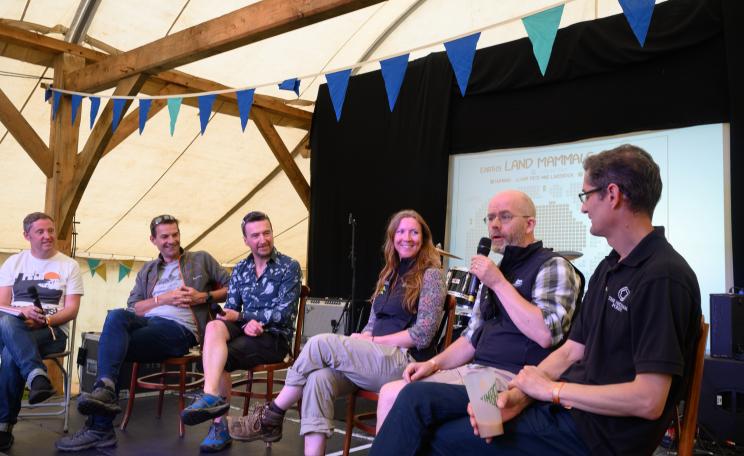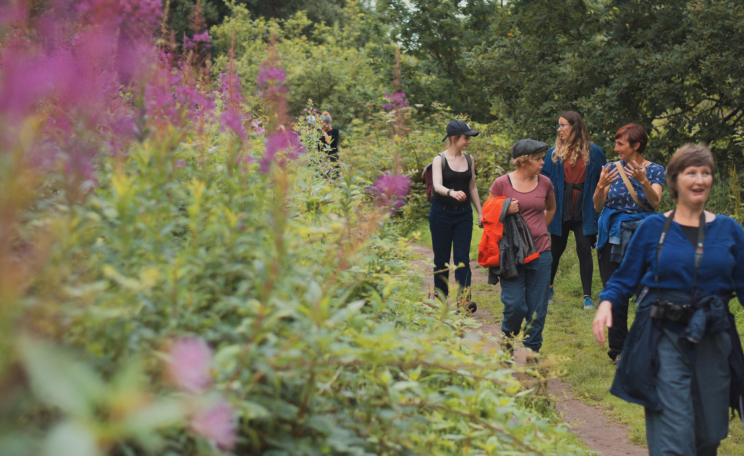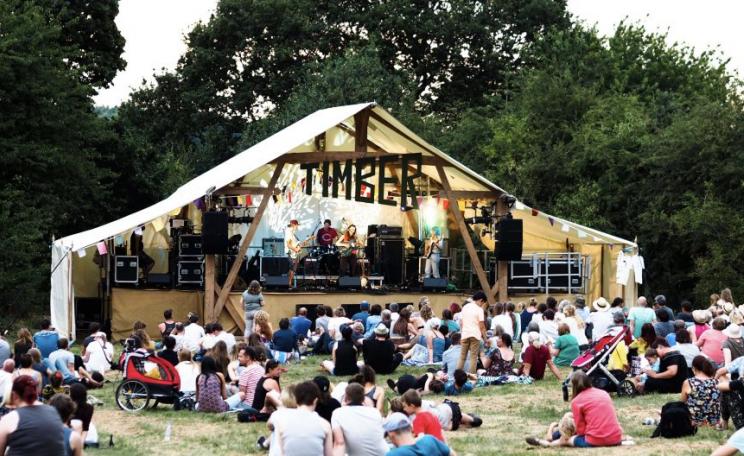It has taken a global pandemic for people to rediscover the value of walking in green space and to realise the solace nature affords.
Children need nature and nature needs children. I knew this to be true as we gathered under a tarpaulin, swung in hammocks, played in the rain.
My first class of nine-year-olds taught me this, as they struggled to cope with being indoors, yet flourished whenever we took our learning to the river, woods or meadow. I discovered this with my move to early years teaching, when young children proved that they could play outdoors for the whole day, in any weather.
To make a donation to support the next Timber festival, visit JustGiving.
Then I believed this in my heart when, trained as a Forest School leader, I heard children, who never spoke in school, shout for joy as they rolled down the hill. I watched them skip along the farm track then fall silent as they entered the woods, as if walking into some great green cathedral.
Countryside
Forest School turned my class into a community of belonging. Diving deep into the pedagogy of self-directed learning, risky play and pro-environmental behaviour together we unearthed the treasure and truth which Forest School offers. That when we learn to care for ourselves, for others and for the natural world we are truly human.
The ethos and principles of Forest School help us become resilient, empower us to manage risk and take responsibility for our own actions. Discovering the seasons with deepening intimacy, the colours and shapes of our favourite trees, we understand that humans are part of nature.
Research shows the value of time spent in woodlands for our wellbeing; Forest Bathing studies in Japan, the Good from Woods Project (Plymouth University & partners 2010-2014), and most recently the MENE ‘Summary of nature connectedness, well-being and pro-environmental behaviours’ (March 2020) which finds a significant correlation between greater time spent in nature - at least once a week - and the number of people reporting they believe life is worthwhile.
It has taken a global pandemic for people to rediscover the value of walking in green space and to realise the solace nature affords. The huge inequities of access to safe outdoor places is glaringly apparent; the consequences for disadvantaged families devastating.
As Covid-19 steals schooling, play parks and time with extended family and friends we understand what really matters to us; our basic human needs of safety, belonging and connection, freedom, power, and play are all threatened. For those children living in homes without gardens, or access to the countryside, lockdown becomes an even greater imprisonment.
It has taken a global pandemic for people to rediscover the value of walking in green space and to realise the solace nature affords.
Hope
I believe quality Forest School is superbly placed to redress this imbalance, enabling schools to open safely, and to be a significant part of the green recovery. Giving space, offering a rich natural environment with time for children and young people to reconnect.
Forest School engenders resilience as participants discover the power of learning through mistakes, tackling real life challenges like lighting a fire in the rain. Forest School cares for the mental and physical health of everyone involved, including the adults, through intentional community building, the acceptance and valuing of each individual.
Joining the Forest School Association (FSA), I found a wealth of wisdom and generosity of spirit. Lifelong educators, teachers, play workers, experts on wildlife and bush craft, environmentalists, artists and musicians, all committed to learning together, promoting holistic development and compassion for the natural world.
The Forest School approach offers richly playful nature connection and is used with people of all ages. In one programme nursery children play alongside elderly care home residents, in others young autistic adults discover connection sitting around the fire or building a shelter.
Swinging in a hammock and clambering carefully through nettles provides rich sensory experiences whilst navigating uneven ground and climbing trees develops physical agility, and the empowerment of managing risk.
Outcomes
The FSA advocates “quality Forest School for all” - promoting learner centred risky play, throughout the seasons and in all weathers.
Together we learn to minimise the impact of our playing and making: planting trees, working to improve habitats for wildlife, we get to know our woodland as a living, connected community, rich in species. We become guardians of our part of the planet.
Big life questions are explored as young children care for worms washed up on a path; full funeral rites are given to squashed beetles and dead birds. Teenagers open up as they chop wood for a fire or work with a friend to make a greenwood chair.
More than ever the space to have safe conversations about life and death, to process difficult emotions, will be needed.
Encouraged to take our time, given space to lie in long grass, we begin to tell stories; poking fingers into holes in the ground or following narrow paths that lead to, as yet untold, adventures we begin to communicate deep thoughts and try out new ideas.
As we breathe in oxygen from the trees, and exhale carbon dioxide - taken up by the trees during photosynthesis. We begin to calm. Our jangled nerves and busy minds find ease, our heartbeat tunes in to the trees, to the people around us and we become grounded.
Timber 2019
Jumping at the invitation to gather at Timber Festival, Forest School practitioners created a pop-up Forest School site to share stories, play with puppets, create poetry and art. Celebrating the growth of the National Forest, we looked out over the new lake, watching gulls wheeling overhead and landfill being turned into a wooded haven for animals and birds.
We listened to music, tasted delicious food, made new friends, reignited our passion for saving this beautiful, living planet. We remembered how important it is to listen to the young, to really hear what they are saying, to follow their lead.
United by our love of trees, forests and woodland we were given the freedom to share the learner centred approach with families at Feanedock. What surprised us was how many adults without children ventured into our glade to use natural materials to create, enjoying the quiet space and time, given freedom to play in the company of trees.
Timber was a joyful weekend of discovering new ways to mentor nature connection, deepen our knowledge of climate breakdown and sustainability from the diverse workshops, speakers and artists.
Coronavirus has prevented us from gathering at Timber this year. We will return next year to play in the woods. To advocate for trees, nature and people. Together we will restore what has been lost and learn to live in healthier, kinder ways, certain that life is worthwhile.
This Author
Sarah Lawfull is a director of the Forest School Association, an FSA endorsed trainer and professional coach. Woodlands make her happy.
Andrew Weatherall works at the National School of Forestry, University of Cumbria. Jo Maker is the Timber Festival coordinator, The National Forest Company. They are together the guest editors of this Special Collection in The Ecologist. To make a donation to support the next Timber festival, visit JustGiving.




